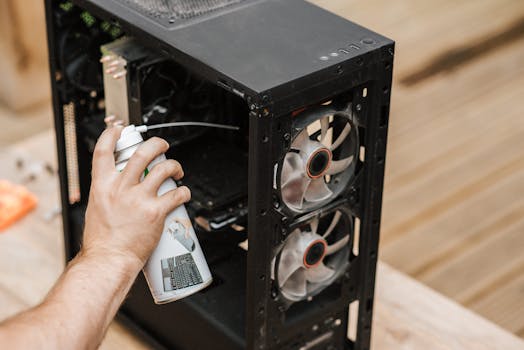-
Table of Contents
“Keep your computer running smoothly with these essential routine maintenance tips.”
Introduction
Introduction: Routine computer maintenance is essential to ensure optimal performance and longevity of your device. By following a few simple tips, you can keep your computer running smoothly and prevent potential issues. In this article, we will provide you with some valuable computer maintenance tips that can help you maintain the health and efficiency of your system.
The Importance of Regular Software Updates for Computer Maintenance
Routine Computer Maintenance Tips
Regular software updates are an essential aspect of computer maintenance. In today’s digital age, where technology is constantly evolving, it is crucial to keep your computer’s software up to date. This article will discuss the importance of regular software updates for computer maintenance and provide some tips on how to ensure that your computer is always running smoothly.
First and foremost, software updates are released by developers to fix bugs and security vulnerabilities. As technology advances, hackers and cybercriminals are constantly finding new ways to exploit weaknesses in software. By regularly updating your computer’s software, you can protect yourself from these threats and ensure that your personal information remains secure.
In addition to security, software updates also improve the performance of your computer. Developers often release updates to optimize the software, making it run faster and more efficiently. These updates can help to resolve any compatibility issues and ensure that your computer is running at its best.
Furthermore, software updates often introduce new features and functionalities. By keeping your software up to date, you can take advantage of these new features and enhance your overall computing experience. Whether it’s a new photo editing tool or a more user-friendly interface, software updates can bring exciting improvements to your computer.
Now that we understand the importance of regular software updates, let’s discuss some tips on how to ensure that your computer is always up to date. Firstly, it is recommended to enable automatic updates on your computer. Most operating systems and software applications have an option to automatically download and install updates. By enabling this feature, you can ensure that your computer receives the latest updates without any manual intervention.
Additionally, it is essential to regularly check for updates manually. While automatic updates are convenient, they may not always catch every update. Some software applications require manual intervention to initiate the update process. Therefore, it is a good practice to periodically check for updates and install them promptly.
Another tip is to keep your computer’s operating system up to date. Operating system updates often include important security patches and performance enhancements. By regularly updating your operating system, you can ensure that your computer is protected from the latest threats and running smoothly.
Lastly, it is crucial to update your software applications regularly. Many software applications, such as web browsers, antivirus programs, and productivity tools, receive frequent updates. These updates often address security vulnerabilities and improve performance. By keeping your software applications up to date, you can ensure that you are using the latest and most secure versions.
In conclusion, regular software updates are vital for computer maintenance. They help to protect your computer from security threats, improve performance, and introduce new features. By enabling automatic updates, regularly checking for updates manually, and keeping your operating system and software applications up to date, you can ensure that your computer is always running smoothly. So, make it a habit to prioritize software updates and keep your computer in top shape.
Essential Steps for Cleaning and Organizing Your Computer Files

Routine Computer Maintenance Tips
Essential Steps for Cleaning and Organizing Your Computer Files
In today’s digital age, computers have become an integral part of our lives. Whether it’s for work, entertainment, or communication, we rely on our computers to perform a wide range of tasks. However, just like any other machine, computers require regular maintenance to ensure optimal performance and longevity. One crucial aspect of computer maintenance is cleaning and organizing your computer files. In this article, we will discuss some essential steps to help you keep your computer files in order.
First and foremost, it is essential to regularly clean up your desktop. A cluttered desktop not only looks messy but can also slow down your computer’s performance. Take a few minutes each week to go through your desktop and remove any unnecessary files or shortcuts. Create folders to categorize your files and move them into their respective folders. This simple step will not only make your desktop look cleaner but also make it easier for you to find specific files when you need them.
Next, it is crucial to regularly clean up your downloads folder. Over time, this folder can accumulate a significant amount of files, many of which you may no longer need. Sort through your downloads folder and delete any files that are no longer necessary. If you come across files that you want to keep but don’t need immediate access to, consider moving them to an external hard drive or cloud storage to free up space on your computer.
Another important step in organizing your computer files is to regularly back up your data. It is always a good idea to have a backup of your important files in case of a computer crash or accidental deletion. There are several ways to back up your data, including using an external hard drive, cloud storage services, or even burning files onto DVDs. Choose a method that works best for you and make it a habit to back up your files regularly.
In addition to cleaning up and organizing your files, it is also crucial to regularly update your software. Software updates often include bug fixes, security patches, and performance improvements. By keeping your software up to date, you can ensure that your computer is running smoothly and protected from potential security threats. Set your computer to automatically install updates or regularly check for updates manually.
Furthermore, it is essential to regularly scan your computer for viruses and malware. Viruses and malware can not only slow down your computer but also compromise your privacy and security. Install a reliable antivirus software and perform regular scans to detect and remove any malicious programs. Additionally, be cautious when downloading files or clicking on links from unknown sources to minimize the risk of infecting your computer.
Lastly, consider organizing your files using a file naming system that makes sense to you. This can help you quickly locate specific files and avoid the frustration of searching through a cluttered mess. Choose a naming convention that suits your needs, such as including dates, project names, or keywords in the file names. Consistency is key when implementing a file naming system, so make sure to stick to it.
In conclusion, cleaning and organizing your computer files is an essential part of routine computer maintenance. By regularly cleaning up your desktop and downloads folder, backing up your data, updating your software, scanning for viruses, and implementing a file naming system, you can ensure that your computer runs smoothly and efficiently. Taking these steps will not only improve your computer’s performance but also make it easier for you to find and access your files when you need them. So, set aside some time each week to give your computer files the attention they deserve and enjoy a clutter-free digital experience.
Best Practices for Preventing and Removing Malware on Your Computer
Best Practices for Preventing and Removing Malware on Your Computer
In today’s digital age, computer security is of utmost importance. With the increasing prevalence of malware, it is crucial to take proactive measures to protect your computer from potential threats. By following some best practices for preventing and removing malware, you can ensure the safety and security of your valuable data.
One of the most effective ways to prevent malware from infecting your computer is to install reliable antivirus software. This software acts as a shield, constantly scanning your system for any malicious programs or files. It is essential to keep your antivirus software up to date, as new threats emerge regularly. Regularly updating your antivirus software ensures that it can effectively detect and remove the latest malware.
Another important step in preventing malware is to exercise caution when browsing the internet. Avoid visiting suspicious websites or clicking on unknown links, as they may lead to malware infections. It is also advisable to refrain from downloading files from untrusted sources. By being mindful of your online activities, you can significantly reduce the risk of malware infecting your computer.
Regularly updating your operating system and other software is another crucial aspect of preventing malware. Software updates often include security patches that address vulnerabilities that could be exploited by malware. By keeping your system and software up to date, you can minimize the chances of malware infiltrating your computer.
In addition to preventive measures, it is essential to know how to remove malware if your computer becomes infected. If you suspect that your computer has been compromised, the first step is to disconnect it from the internet. This prevents the malware from spreading further and potentially causing more damage.
Once disconnected, you can use your antivirus software to scan your system and remove any detected malware. It is advisable to run a full system scan to ensure that all infected files are identified and eliminated. In some cases, the antivirus software may not be able to remove all malware, especially if it is a sophisticated or persistent threat. In such situations, it may be necessary to seek professional assistance from a computer security expert.
Regularly backing up your data is another crucial aspect of computer maintenance. In the event of a malware infection, having a recent backup ensures that you can restore your files and minimize data loss. It is recommended to use an external hard drive or cloud storage for backups, as they provide an additional layer of protection against malware.
Lastly, it is important to educate yourself about the latest malware threats and techniques used by cybercriminals. Staying informed allows you to recognize potential risks and take appropriate measures to protect your computer. There are numerous online resources, such as cybersecurity blogs and forums, where you can learn about the latest trends in malware and how to safeguard your computer effectively.
In conclusion, preventing and removing malware from your computer requires a combination of proactive measures and knowledge. By installing reliable antivirus software, exercising caution while browsing the internet, regularly updating your system and software, and backing up your data, you can significantly reduce the risk of malware infections. In the unfortunate event of an infection, disconnecting from the internet and using antivirus software to scan and remove malware is crucial. By following these best practices, you can ensure the safety and security of your computer and valuable data.
Q&A
1. What are some routine computer maintenance tips?
– Regularly update your operating system and software.
– Run antivirus scans to detect and remove any malware.
– Clean your computer’s hardware, such as the keyboard and mouse, to prevent dust buildup.
2. How often should I perform routine computer maintenance?
– It is recommended to perform routine computer maintenance at least once a month.
3. Why is routine computer maintenance important?
– Routine computer maintenance helps improve performance and reliability, prolongs the lifespan of your computer, and protects against security threats.
Conclusion
In conclusion, routine computer maintenance is essential for ensuring optimal performance and longevity of your device. By following these tips, such as regularly updating software, running antivirus scans, cleaning up disk space, and backing up important data, you can prevent potential issues and keep your computer running smoothly. Additionally, practicing safe browsing habits and being cautious of downloading suspicious files or programs can further enhance the security and overall health of your computer. Taking the time to perform these routine maintenance tasks can save you from potential headaches and costly repairs in the long run.

